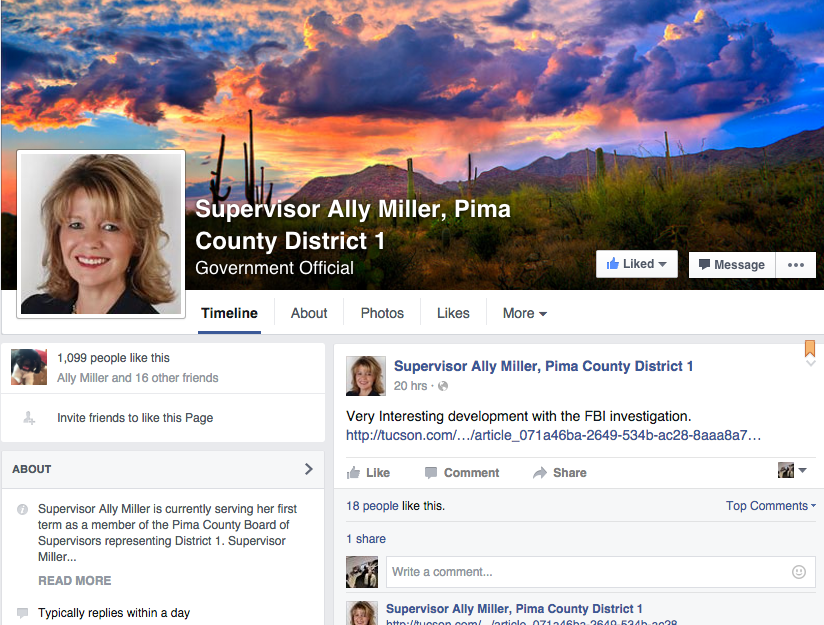Some Pima County officials who use social media to communicate with constituents are blocking users, deleting comments and failing to adequately maintain the exchanges as required by the state’s public records law, a review shows.
For example, Supervisor Ally Miller did not provide documents that show critical comments were deleted from her official Facebook account, which is funded by taxpayers.
When asked at a recent meeting why those records were not included among the information provided to the Star under a public records request to the county, Miller was dismissive and denied knowledge of any deleted comments. “I’m so glad we have such big issues,” Miller said.
The Star requested social media records from the county after Administrator Chuck Huckelberry in January told county elected officials that state records laws apply to social media communications. The Star requested the records in an effort to identify deleted comments and the identities of blocked or restricted users.
“Any Facebook or social media communication is a public record, just like an email,” said Phoenix-based attorney Dan Barr, who has worked for the Star and handles First Amendment and public records issues across Arizona.
He said the type of communication, whether it’s written or electronic, doesn’t change its status as a public record.
Failure to provide public documents opens a governmental body to lawsuits and potential civil penalties.
For elected officials, general correspondence with the public typically have to be retained for two calendar years. That includes written or digital communications.
“What the content is determines the retention schedule,” said Jerry Lucente-Kirkpatrick, a records analyst with the Arizona Secretary of State’s Library, Archives and Public Records Division.
COUNTY DATA
When county officials fulfilled the Arizona Daily Star’s request, the documents included lists of blocked Facebook and Twitter accounts from the sheriff’s, library, animal care, communications and one comment that was deleted on the recorder’s Facebook page.
The Sheriff’s Department provided a list of the accounts it had blocked from commenting on its social media pages.
“We do not delete comments from our Facebook account,” Deputy Courtney Rodriguez said in a follow-up interview. “Persons banned from our account were found to have been in violation of our Terms of Use. Each instance of these violations can be located and are maintained directly on the platform.”
Rodriguez said the department uses Facebook’s hide function to prevent comments made in violation of their terms of use invisible to the public.
Typically, violations include off-topic comments, offensive or threatening language or advertising.
Pima Animal Care Center also provided a list of numerous blocked users. PACC was unable to provide the users’ deleted comments, however. “I don’t believe they were retained,” Pima County Communications Manager Mark Evans said.
In November, the Board of Supervisors unanimously approved a policy governing official county social accounts.
The policy largely mirrors existing state laws, outlining reasons for using social media and requirements and processes for retaining records.
Evans said many of the deleted comments from the PACC Facebook account were removed prior to implementing the policy.
County elected officials, were exempted from the policy but are required to conduct their social media accounts in accordance with state laws regarding production and retention of public records.
In response to the Arizona Daily Star’s request, Pima County Recorder F. Ann Rodriguez’s office provided a print out of a single comment deleted from the office’s Facebook page.
Except for Miller, each supervisor’s office said they had not deleted or blocked content from their social media accounts.
Miller provided a single record, which was a cell phone photo of a computer monitor in her office showing a post a staffer made to Miller’s Facebook account in error that later was removed.
While Miller maintains she is unaware of deleted comments or blocked users, the Pima County Administrator’s Office provided printouts showing numerous comments that were either deleted or removed from Miller’s official Facebook page. The records also showed an additional post the supervisor made and later deleted.
Asked about the deleted comments at a Feb. 16 board meeting, Miller denied any knowledge.
“I haven’t seen any of those,” Miller said.
The Arizona Daily Star provided copies of the documents to Miller and requested comment. She did not respond.
Miller also suggested that members of her staff could bear the responsibility for any deleted Facebook content.
“My whole office has access to that Facebook page,” Miller said.
Miller’s former chief of staff, Jeannie Davis, who was abruptly fired in December, said it was “disappointing” that the supervisor would attempt to blame employees.
“Supervisor Miller was the only one to delete comments and block individuals,” Davis said.
RECORDS RESPONSIBILITY
Modern social media platforms create challenges in retaining public records.
“Facebook has no records management capability,” said Lucente-Kirkpatrick, the state records analyst.
In that case, the responsibility for maintaining the records ultimately lies with those who create them.
In May, Lucente-Kirkpatrick led a training session at Pima County on social media records retention policies.
Attendees included representative from area governments, school districts and elected offices. A representative from Supervisor Miller’s office also attended, a check-in sheet shows.
Some elected officials use software that sends an email of all their social media postings and comments, Lucente-Kirkpatrick said. The emails then can be included on a government’s servers and archived.
No Pima County officials or departments currently use this type of software.
Despite the challenges in capturing the records, Barr said governments have a legal obligation to retain social media records.
“They can’t just say Facebook doesn’t do it,” Barr said.







